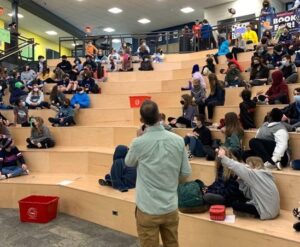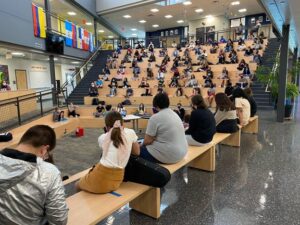By David Rockower

Delta middle teacher, Paul McCormick, leads a whole-school community-building activity (Credit: David Rockower)
It’s tough to have a conversation about State College without mentioning academics. Being near Penn State — one of the 20 largest universities in the country — education is everywhere. However, living under the blue and white umbrella of Penn State, The State College Area School District (SCASD) is sometimes overlooked. But SCASD is a force in its own right.
According to Niche.com, SCASD ranks 14th out of 494 school districts in Pennsylvania. One of the many strengths of the high school is its abundance of course offerings. Beyond traditional core classes, SCASD offers an impressive catalog of electives. Through its career and technical center, students can take classes like business finance, supply chain management, sports marketing, computer science, early childhood education, culinary arts and automotive technology. International Baccalaureate and Advanced Placement courses are offered as well. SCASD does its best to make sure there are educational opportunities for every type of learner.
Ownership of education
Another option for middle and high school students is The Delta Program.
Jon Downs, director of educational alternatives and principal at Delta, explained, “It’s a small, democratic school within State College School District. We have a middle school cohort of grades six to eight and our high school cohort of grades nine to 12.”
“Really it’s a school that is trying to turn the ownership over to the students and to their parents.”
Students and parents help make decisions about how the school operates. For example, each time a new teacher is hired, a committee of teachers, parents and students work with Downs to select the best candidate. Downs continued, “Really it’s a school that is trying to turn the ownership over to the students and to their parents. We want this to be the students’ school, not the teachers’ or administrators’ school. We want it to be a very flat hierarchy, and a really a safe space for kids to take ownership of their education.”

A middle-school student facilitates a weekly all-school meeting (Credit: Jon Downs)
What does this look like in practice?
Students and teachers are on a first-name basis. Classes are mixed-grade-level, so in middle school, grades 6, 7 and 8 are in classes together. At the high school, grades 9, 10, 11 and 12 are in classes together. Each program has an advisory council — comprised of students, parents and teachers — that makes decisions about the school. Students hold the majority vote.
“This year, with guidance from teachers and parents, students changed the cell phone policy. Later, the teachers proposed a new schedule and the kids weren’t necessarily supporting it. They said, ‘Let’s try it for a week,’ so we shifted our schedule matrix for a week. We have a lot of flexibility. I think that’s what sets us apart from traditional schools,” said Downs.
Course offerings are non-traditional. For example, instead of seventh-grade social studies, students can sign up for classes like Digital Citizenship, Law & Order and American History Through Music. Rising 10th grader, Maya Dombroskie, explained just how much she values choice: “I feel like it gives you much more ownership over your education, and when you have ownership over your life and what you’re doing, you’re much more likely to take responsibility and care about the choices you make.”
Student voice is not limited to choosing from a catalog of courses; it bleeds into everyday classroom discussions and decisions about school policy. Delta’s commitment to student voice breeds confidence. Dombroskie said,
“Delta has given me the skills and the practice to always be ready to constructively, but firmly, speak my mind. So, I’m ready to voice my opinion. To make it heard and engage with others about their opinions and really turn it into a constructive forum where everyone is learning and decisions can be made.”
A school that feels like a second home
Molly Countermine’s three children have all attended Delta. “Delta was always on my radar because I knew that it was sort of this little gem of a community school nestled in this really big renowned, academically driven School District,” said Countermine. She knew that she wanted a school that felt like a second home for her kids. When Countermine first took a tour of the school and met with the director and teachers, she recalled a crucial comment: “I remember Jon (Downs) saying ‘We’re a community first and a school second,’ and that was probably one of the most perfect things he could say to my family.”
Countermine also shared how motivating the classes are for her kids: “They’ve got classes that teachers designed because they are passionate about a subject — so a class on what it means to be a good digital citizen, or what it means to write and read sports stories. Your kids are going to find classes they love because the teacher loves teaching them.”
Anytime there is an alternative offering, something different from the norm, rumors will swirl, as people try to conjure a clear picture of what kind of student attends a given school. But Delta isn’t for a specific kind of student. Any independent learner with a desire to be part of a smaller learning community can find success at Delta.
Rising Sophmore Mathes Miller-Priddy summed it up perfectly. “Delta is a school for anyone with an interest in democracy and building community. It’s been an incredible resource and influence on my life and I believe that the skills I’ve gained from being an active member of its community are ones that anyone could use in academia and beyond.”
Citation: Senior, Alum, & Parent. (2019, September 7). Explore State College Area School District. Niche. Retrieved July 12, 2022, from https://www.niche.com/k12/d/state-college-area-school-district-pa/

